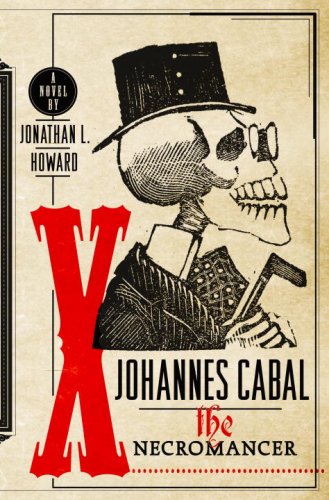
Johannes Cabal the Necromancer
Johannes Cabal Series, Book 1
کتاب های مرتبط
- اطلاعات
- نقد و بررسی
- دیدگاه کاربران
نقد و بررسی

May 4, 2009
When Johannes Cabal, a haughty sorcerer, finds that the absence of a soul is an impediment to his occult studies, he strikes a bargain with Satan in British author Howard's darkly funny debut: in one year's time he'll deliver the bartered souls of 100 unfortunates so that he might repossess his own. Cabal and his vampire brother, Horst, mount a traveling carnival to scour the countryside for men and women desperate enough to consign their souls to an infernal eternity for whatever will relieve their misery of the moment. Cabal proves marginally competent but maximally amusing in his dealings with a competing necromancer, an asylum of escaped lunatics and a staff of slowly decomposing carnies conjured from the dead. Howard capably synthesizes two classic themes of macabre fiction—the pact with the devil and the dark carnival—but the book's episodic structure and unconvincing ending betray it as a freshman effort. Still, Howard's ear for witty banter and his skill at rendering black comedy bode well for the future.

June 1, 2009
Ham-fisted debut tries to get laughs from damnation.
Years ago Johannes Cabal sold his soul to the devil in exchange for becoming a necromancer, hence acquiring the ability to raise the dead. Now his time is up, and Satan would like to reclaim his own. But wait a minute—you know how these things work. At the very gates of hell, facing a damnable stack of forms to fill out, Cabal strikes yet another deal with the devil: He's off the hook if he can get 100 souls to sign on the dotted line and turn themselves over to Satan within a year. Because this ratio seems favorable to the devil, he agrees to the new bargain. It turns out that hell is perhaps bureaucracy run amok, because each putative condemned soul (aka"damnee") needs to sign a Voluntary Damnation Form. Assisted by his necrotic and neurotic brother Horst, and despite being warned that Satan only bets on a sure thing, Johannes"borrows" the devil's Carnival of Discord ("dedicated to taking the souls of the unwary") and begins a merry romp over a strange landscape. Problems abound, of course, provoking Johannes' anger and frustration. At one point he tells a co-worker,"You were a waste of protein when you were alive, and now you're dead you're denying some tree sustenance." The Carnival has all the trappings of sleaziness one would expect, including the aptly named Madame Destiny and dolls that sensuously come to life. As time grows short, Johannes begins to wonder whether he'll make his quota. Finally, of course, it all comes down to one soul to sign and a few more hours to go.
The genuinely funny moments seem to crop up almost by accident—and ultimately few readers will care.
(COPYRIGHT (2009) KIRKUS REVIEWS/NIELSEN BUSINESS MEDIA, INC. ALL RIGHTS RESERVED.)

June 1, 2009
British scientist Johannes Cabal has sold his soul to the Devil in order to learn the secret of life and death through the art of necromancy but now regrets the price he paid. Satan, being bored, agrees to a deal: if Johannes can get 100 people to sign contracts assigning their souls to him, he will return Johannes's. Accepting the bargain, our hero is given one year's time and a traveling carnival to recruit those to be damned. He enlists the help of his older brother Horst, along with many an emanation of Hell, and a great deal of mischief ensues. Tension mounts as time grows short on Johannes's quest, and much is left to the last to tell. But much is also left untold; Johannes Cabal's duel with the Devil may not be the last we hear from him, and that is fine, for Johannes is a compelling character. VERDICT Cross Susannah Clarke's "Jonathan Strange & Mr. Norrell" with Gregory Maguire's "Wicked", and you have this witty and sometimes touching debut novel in the Faustian tradition. This will appeal to both fantasy and horror fans and readers who enjoy imaginative reinterpretations of fables, myths, and fairy tales, but it's humorous rather than frightening.Nancy H. Fontaine, Dartmouth Coll, Lib., Hanover, NH
Copyright 2009 Library Journal, LLC Used with permission.

June 1, 2009
In his debut novel, Howard reimagines the familiar Faustian story of dealing with the devil. More specifically, the scientist Johannes Cabal commits himself to retrieving 100 souls in exchange for his own. Howards background as a game designer is unsurprising, as the novel unfolds episodically as a series of challenges. Indeed, raising the dead has long been a popular theme in fantasy role-playing. Howard offers little background, and one can almost picture Cabal on the screen, accomplishing each task before moving to the next en route to his eventual meeting with Satan. Although the scenes are varied and energetically drawna fantastical carnival and vampire are prominently involvedthe dialogue is more precious than humorous. Several characters aspire to be little beyond grotesque caricatures. Howard can be delightfully original, as when he describes a tree that might have been an elm before being regularly watered with LSD, but the novel ultimately distinguishes itself through its tone, which is consciously melodramatic, dark but never dismal.(Reprinted with permission of Booklist, copyright 2009, American Library Association.)

























دیدگاه کاربران